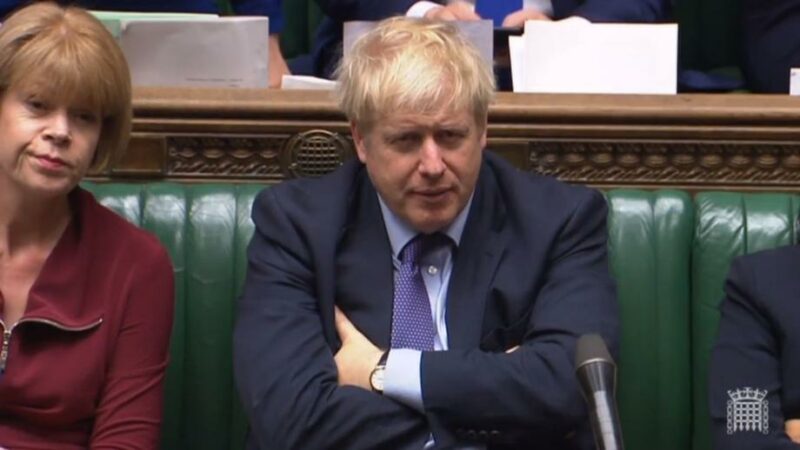He's incompetent and lazy and he needs to be loved.

Attacking Boris Johnson for his tendency to lie, exaggerate, and offend, as well as his questionable personal morals, is futile.
To use stock market terminology, these characteristics are already in the price, just as they were with Donald Trump in 2016.
When Labour members vote for a new leader, they should select a politician who, among other qualities, can focus on the prime minister’s laziness, incompetence and need to be loved.
This requires the ability to use Prime Minister’s Questions to persistently mine down into the detail of the government’s performance, coupled with the quick-wittedness to mock Johnson for his narcissism.
Laziness and Incompetence
Johnson’s notorious laziness is one of the reasons he is incompetent. No one ever accused Boris of idleness when it came to churning out his lucrative Telegraph columns.
However, a weakness that should be exploited by the next leader of the Opposition should be Johnson’s reluctance to put the effort required into matters that don’t interest him. Read Chris Mullins’ superb diaries for an insight into how tedious ministerial duties can be.
According to Ben Rooney, Johnson’s former Telegraph colleague, “Getting him to do work he didn’t want to do was difficult. He was absolutely uninterested in detail.” Rooney told The Beast that Johnson’s copy was full of mistakes because he was too lazy to do the research required.
When Johnson was Foreign Secretary, his officials were so concerned about his short attention span that they inserted bizarre items into his written briefings to test whether he had read them.
Boris reportedly never mentioned them: he could only manage five minutes on any topic before he became bored.
The same disinterest in essential detail was noted throughout his eight years as mayor of London. Brian Coleman recalls that he spent, “half my meetings as his fire chairman telling him what I told him at the last meeting.”
On Syria and Libya, EU officials complained that it was obvious Johnson was out of his depth, neither serious nor prepared.
It is little wonder then that as Foreign Secretary he ruined Nazanin Zaghari-Radcliffe’s life by wrongly telling the Iranian regime that she had been teaching in Iran, rather than visiting her family.
Having “the attention span of a gnat” leads to mistakes that are far more serious than comparing Francois Hollande to a prison camp guard or trying to quote Kipling in Myanmar.
Theresa May side lined Johnson when her government discussed the Russian attack in Salisbury; and officials said when he tried to rally support at the G7 for sanctions on Russia over its role in Syria, he “did not do the ground work to see it through.” It is telling that only one minister at the Foreign Office backed him when he stood for Tory leader.
The need to be loved
Tom Copley was a Labour member of the London Assembly when Boris was mayor. He told Labour List that Johnson hated it when jokes were made at his expense. He needed the approval of the crowd, and was wrong-footed when he lost their sympathy.
Whitehall veterans observed , “He likes to be liked,” and “he’s very interested in pleasing his audience.” He was visibly shaken when a small crowd stood outside his home jeering him during the referendum campaign in 2016.
It was also noticeable how quickly he withdrew from public scrutiny as the 2019 election campaign progressed: not everyone was hanging on his next joke, especially when their towns were flooded or their children were lying on hospital floors.
As foreign secretary, EU foreign ministers reportedly expected him to argue strenuously for British interests, but Boris preferred to be liked, so he did not speak up. The implications of this character flaw are terrifying.
He who prospers by his personality shall be destroyed by it.
Labour supporters may not like to admit it, but Boris is liked by a significant proportion the public e.g. people who do not actually know him.
Conservative MPs chose Boris not because they liked him but because they knew his popularity would help them hold their seats. The moment the public become bored or irritated by Johnson’s antics, the Tories will drop him: he has few friends or admirers among their ranks.
A final plea to whomever becomes the next Labour leader: do not place too much blame on Dominic Cummings because he can and will be fired at an opportune moment, the scapegoat who frees Johnson from responsibility.
Boris can be rattled by sustained cross-examination on detail at Question Time, and by being mocked. His vote-winning act could quickly disintegrate, and with it his popularity. Labour needs a leader who can exploit those weaknesses with grace and persistence.
Rebecca Tinsley is the author of When the Stars Fall to Earth, available in English and Arabic.
To reach hundreds of thousands of new readers we need to grow our donor base substantially.
That's why in 2024, we are seeking to generate 150 additional regular donors to support Left Foot Forward's work.
We still need another 117 people to donate to hit the target. You can help. Donate today.



